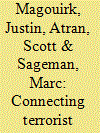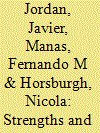| Srl | Item |
| 1 |
ID:
080882


|
|
|
|
|
| Publication |
2008.
|
| Summary/Abstract |
This article highlights initial findings from the authors' Global Transnational Terrorism (GTT) Project, which began in August 2006. The case study draws on the database work for Southeast Asia and charts the rise of a militant minority within Jemaah Islamiyah, which was directly responsible for a series of attacks from 2000-2005. The important but restricted role of radical madrassahs and the importance of kinship emerge clearly from the study. On a more theoretical plane, the article shows how leadership "niches" opened up by unplanned events create contingent opportunities that lead to new developments.
|
|
|
|
|
|
|
|
|
|
|
|
|
|
|
|
| 2 |
ID:
080884


|
|
|
|
|
| Publication |
2008.
|
| Summary/Abstract |
How will the strategy of spreading democracy affect the threat of terrorism from Al Qaeda and likeminded Islamic extremist groups? This article analyzes how spreading democracy would impact four different sets of underlying motivations that lead to this kind of terrorism. It will show that the widespread belief in the power of democracy is likely misplaced because democracy will be unlikely to change perceptions of occupation, will itself threaten Islamic identity and culture, will be unlikely to mitigate economic grievances, and will be unlikely to provide a more legitimate government than one based on religious law.
|
|
|
|
|
|
|
|
|
|
|
|
|
|
|
|
| 3 |
ID:
080885


|
|
|
|
|
| Publication |
2008.
|
| Summary/Abstract |
The current article seeks to add to the quantitative approach to understanding terrorism by examining the logic underlying terrorist choice of targets and timing within the context of the Chechen-Russian conflict. Using data on Chechen rebel bombings in Chechnya and Russia from 1997-2003, the analysis revealed support for a logic underlying terrorist choice of targets. The results indicated that civilian targets were more likely to be targeted in Russia than in Chechnya, illustrating the importance of examining contextual effects within quantitative approaches to terrorism. The results also implicated an affect of weather and urbanization. Implications of the results and future directions for research are discussed
|
|
|
|
|
|
|
|
|
|
|
|
|
|
|
|
| 4 |
ID:
080883


|
|
|
|
|
| Publication |
2008.
|
| Summary/Abstract |
Grass-roots jihadist networks represent a launch-pad for the Global Jihad Movement, particularly in Europe and the United States. This article explores the concept of a grass-roots jihadist network, the profile of its members, and what influence the network may have on key elements within the Global Jihad Movement. The article will also analyze in detail the strengths and weaknesses of these networks. To do so, it will use the Madrid bombings in March 2004 as a case study
|
|
|
|
|
|
|
|
|
|
|
|
|
|
|
|
| 5 |
ID:
080886


|
|
|
|
|
| Publication |
2008.
|
| Summary/Abstract |
Using Iraq and Afghanistan as case studies, this article explores several critical questions. First, what is the scope of the relationship among criminal organizations, terrorists, and insurgents? The analysis is drawn from theoretical approaches but also relies on government studies and open source reports. Second, how has the transitional period between post-conflict and reconstruction/nation-building created fertile ground for strengthening the criminal-terrorist-insurgent continuum? This is a particularly important issue as the Bush administration engages international organizations. Lastly, what can the United States and its Coalition allies do to mitigate the security challenges presented by the criminal-terrorist-insurgent problem in the these two countries?
|
|
|
|
|
|
|
|
|
|
|
|
|
|
|
|